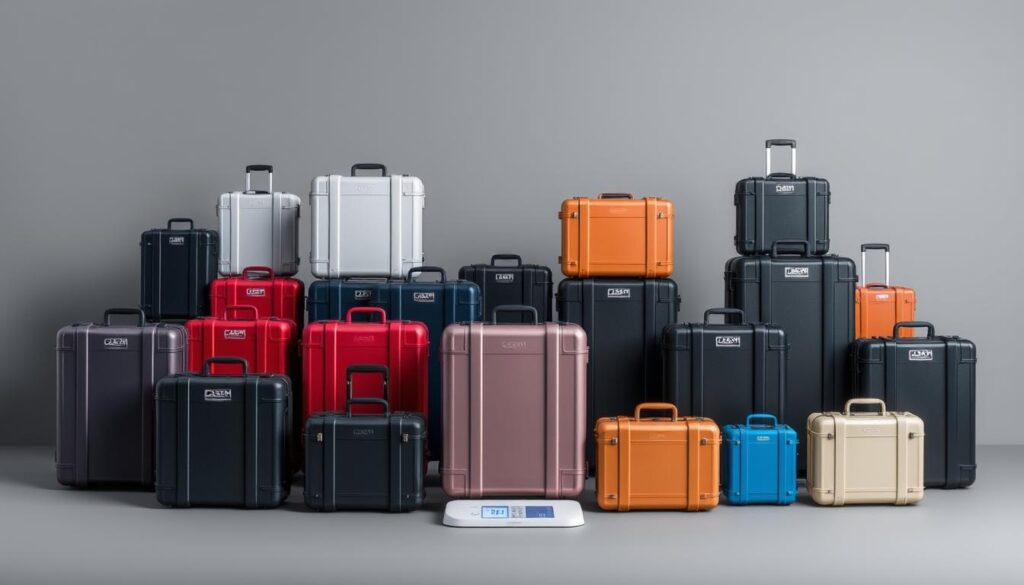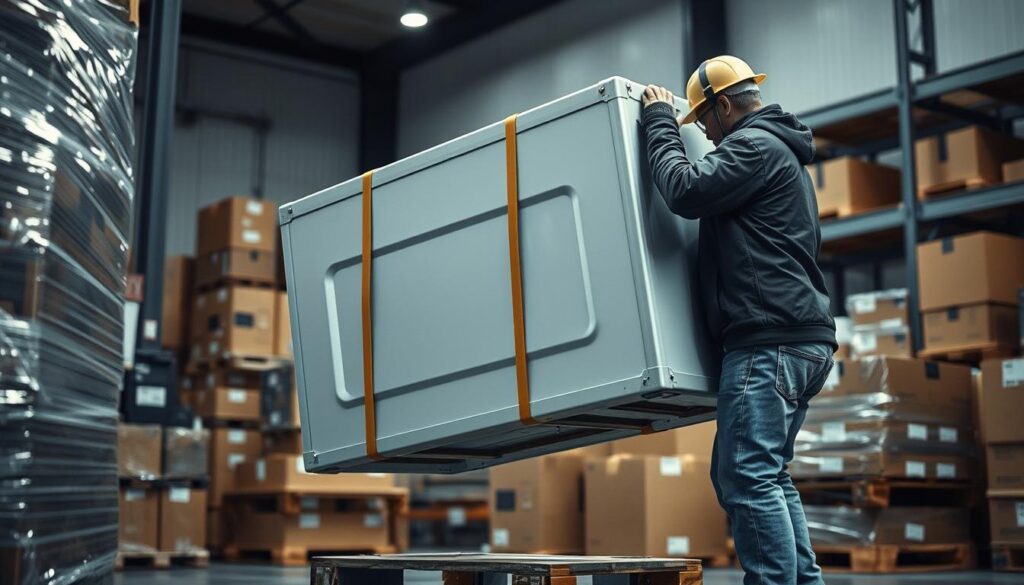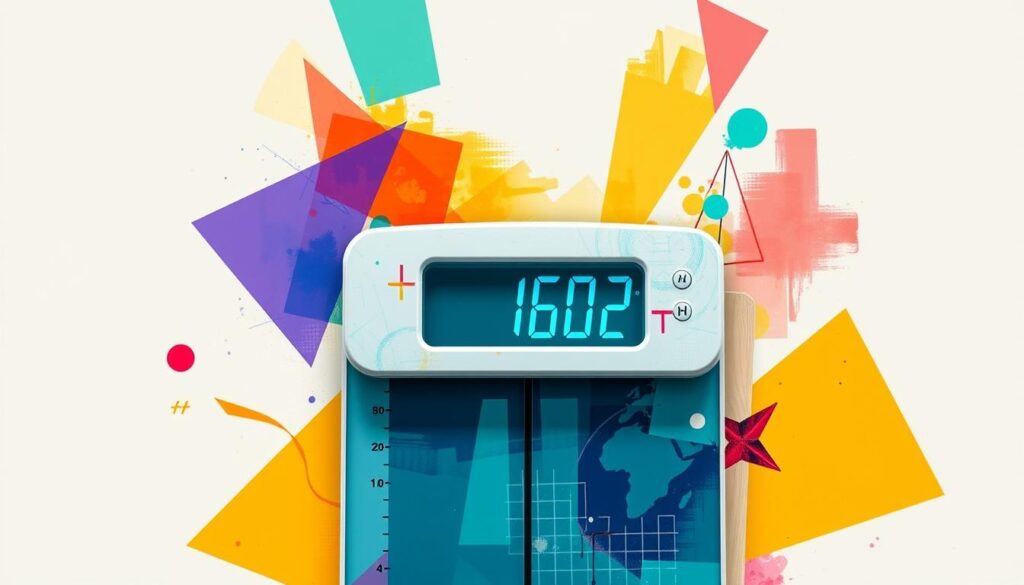Knowing the weight of Caseoh, a leading portable oxygen concentrator, is key for its use and moving it around. This detailed guide looks at the weight specs of Caseoh. It covers what affects its weight, the various models, and why it’s important to handle and manage its weight right.
Key Takeaways
- Caseoh’s weight usually goes from 5 to 30 pounds, based on the model and its design.
- Heavy-duty types can be over 30 pounds, perfect for industrial use.
- Portable models like Caseoh are often 5 to 8 pounds, making them easy to carry.
- The materials and design details play a big role in Caseoh’s weight.
- Understanding the weight of Caseoh helps with planning, affecting shipping prices and how it’s stored.
Introduction to Caseoh
Caseoh plays a vital part in the construction and shipping industries. It helps a lot with the safe and efficient movement of goods. Knowing the weight of Caseoh and understanding its specifications are very important. This is true for anyone working in these fields. Caseoh’s design is strong and flexible, making it useful for many tasks.
The weight of a typical Caseoh is about 180 pounds (82 kg). This weight is key for planning and operating in various industries. Its well-thought-out design features make Caseoh essential for project managers, engineers, and safety officers.
Let’s take a closer look at the weight of Caseoh and its important specs. These points show why it’s a top pick in many fields:
| Specification | Details |
|---|---|
| Weight | 180 pounds (82 kg) |
| Versatility | Applicable in construction and shipping |
| Design Elements | Robust and multifunctional |
Getting to know Caseoh, including its weight, is key for good planning and safety. This knowledge helps in managing transportation better. Thus, it ensures the best use of the device in various situations.
Factors That Affect the Weight of Caseoh
Understanding how different factors affect Caseoh’s weight is vital. It helps make smart choices about portable oxygen equipment. The weight of Caseoh mainly depends on its materials, design, and the environment.
Material Composition
The materials used in Caseoh play a big role in its weight. Using metals, plastics, and composites can change how heavy it is. For example, lighter materials make Caseoh easier to carry.
Design and Structure
Caseoh’s design and structure also impact its weight. Smaller designs and smart structures improve how easy it is to move around. Manufacturers try to find a good balance between making it light and keeping it functional.
Environmental Conditions
The environment can make Caseoh heavier over time. Moist air can make some materials heavier by adding moisture. Plus, being in tough environments might mean adding extra protective layers. This can make the equipment weigh more.
Here is a summary of the main factors and how they affect Caseoh’s weight:
| Factor | Impact on Weight |
|---|---|
| Material Composition | High |
| Design and Structure | Medium |
| Environmental Conditions | Variable |
The Average Weight of Standard Caseoh Models
To know the average weight of standard Caseoh models, we look at materials and designs. Typically, standard Caseoh model weights can vary a lot. This variation depends on their use and what they’re made of.
Computer cases, for example, can weigh from 2.5 kg to 20 kg (5.5 lbs to 44 lbs). The material matters a lot here. They can be aluminum, steel, or plastic. For protective gear, the weight can range from 1 kg to 25 kg (2.2 lbs to 55 lbs). This is due to different materials like hard plastics, aluminum, and composite fiber.

Industrial equipment cases are generally heavier. They can weigh from 15 kg to 70 kg (33 lbs to 154 lbs). When looking at standard Caseoh model weights, the design and purpose greatly affect their weight.
| Case Type | Average Weight (kg) | Average Weight (lbs) |
|---|---|---|
| Computer Cases (Aluminum) | 2.5 – 5 | 5.5 – 11 |
| Computer Cases (Steel) | 7 – 15 | 15 – 33 |
| Computer Cases (Plastic) | 3 – 6 | 6.6 – 13 |
| Protective Equipment Cases (Hard Plastic) | 1.5 – 10 | 3.3 – 22 |
| Protective Equipment Cases (Aluminum) | 3 – 12 | 6.6 – 26 |
| Protective Equipment Cases (Composite/Carbon Fiber) | 2 – 8 | 4.4 – 17.6 |
| Industrial Equipment Cases (Small) | 10 – 20 | 22 – 44 |
| Industrial Equipment Cases (Large) | 30 – 70 | 66 – 154 |
Many things can affect the overall weight of a case. Things like where it’s going to be used and the size of the gear. As standard Caseoh models become more versatile, knowing these weights is very helpful.
Different Types of Caseoh and Their Weights
Exploring caseoh types and weights is important to find the right match for your needs. Whether you’re looking for a everyday model, a heavy-duty one for work, or a portable kind, knowing their weights helps choose correctly.
Standard Models
Standard caseoh types and weights are made for daily use. They often weigh between 10-15 pounds. This makes them good for a variety of tasks.
Heavy-Duty Variants
Heavy-duty Caseoh models are built for tough jobs. They can weigh as much as 30 pounds. This weight adds to their strength and life span in hard uses.
Portable Variants
Portable Caseoh models are perfect for those on the go. They are much lighter, making them easy to carry. Knowing the specs of compact oxygen generators helps you pick the best small model.
| Caseoh Type | Weight Range (lbs) |
|---|---|
| Standard Models | 10-15 |
| Heavy-Duty Variants | Up to 30 |
| Portable Variants | Light-weight |
Each type has its unique benefits for certain uses. By looking at the caseoh types and weights and compact oxygen generator specs, users can find the best model. This ensures great use and value.
How to Calculate the Weight of Caseoh
To figure out Caseoh’s weight, you must consider its parts and their weights. This guide makes it easy to calculate CaseOh’s total mass, which is crucial for managing and moving it. Knowing that CaseOh weighs about 247 lbs or 112 kg is important for this process.
Start by looking at all the parts and accessories of CaseOh. Measure each piece on its own. Then, add these weights together for the total.
Here’s how to do it step by step:
- List every part and accessory. Think about the main unit, any add-ons, controls, and even specific gear like a miniature oxygen unit mass.
- Measure each item with a precise digital scale. Ensure the scale is correct and on a level surface for accuracy.
- Add the weights of all items to find CaseOh’s total mass.
For accurate measurements, weigh items more than once. Use the average of these readings if they differ. Remember, the environment can affect Caseoh’s weight. Things like moisture or temperature changes matter.
Knowing details about CaseOh’s setup helps too. This includes understanding how its collaborations with companies like GamerSupps and Youtooz might add to its complexity and weight.
It’s important to measure Caseoh’s weight accurately for uses that need exact weight details, like in medicine. Using proven tools and approaches guarantees reliable and consistent outcomes.
Also, getting the exact weight of a miniature oxygen unit is key for good management and efficiency. Keeping detailed weight records helps with better Caseoh care and transportation.
To wrap up, here’s a glance at possible weights for different components:
| Component | Weight (lbs) | Weight (kg) |
|---|---|---|
| Base Unit | 180 | 81.6 |
| Attachments and Controls | 30 | 13.6 |
| Specialized Equipment (e.g., Miniature Oxygen Unit) | 37 | 16.8 |
Tips for Handling and Transporting Caseoh
Proper handling and transport of Caseoh are vital for safety and efficiency. This section offers practical tips for moving Caseoh safely. Following these guidelines can lower risks and make transportation smoother.

Proper Lifting Techniques
Correct lifting techniques are key to prevent injuries. Here are important tips to remember:
- Position your body: Stand close to the Caseoh, feet apart for stability. Bend your knees, not your back, keeping it straight.
- Use your legs: Lift the Caseoh with your legs. This spreads the weight and cuts down muscle strain.
- Avoid twisting: Turn your entire body. Twisting your back can cause injuries.
- Get help if needed: If it’s too heavy, ask for help or use the right tools.
Use of Transport Equipment
Choosing the right tools can improve Caseoh handling. Consider these:
- Hand trucks and dollies: Great for moving Caseoh easily, especially over distances. Make sure it’s secured before moving.
- Pallet jacks: Perfect for heavier Caseoh in warehouses. They lift and move pallets with ease.
- Forklifts: Essential in industrial areas for moving heavy or many Caseoh. Only trained and certified operators should use them.
Safety Gear
Wearing the right gear protects you when handling Caseoh. Here’s what you need:
- Protective gloves: Gloves improve grip and protect hands from cuts or abrasions.
- Safety shoes: Shoes with steel toes and non-slip soles keep feet safe and prevent falls.
- Back support belts: A back belt adds stability and lowers the risk of back injuries.
- Eye protection: In dusty environments, safety goggles are a must to protect your eyes.
For more Caseoh transport tips and to improve your handling methods, check out experts online. These safety steps can change how you transport Caseoh, keeping workers and the product safe.
Caseoh Weight in Different Applications
The weight of Caseoh products changes based on use. This affects logistics, rules, and how much space they use. Whether it’s for health, personal enjoyment, or work, knowing about these weights helps pick the best product.
Medical Use
In healthcare, the weight of a portable oxygen device by Caseoh is vital. Doctors need tools that are easy to move and work well. This matters a lot for patients who can’t move easily or in urgent care where time is precious. For example, Casey King, who was 845 pounds, got bariatric surgery in 2019. He lost 600 pounds by eating right and exercising. His journey shows the importance of medical devices that are easy to use during weight loss and for better health. Read more about his story here.
Personal Use
For personal items, Caseoh makes light yet tough products. This is true for phone cases and gadgets. Using light materials without losing strength is key. Caseoh focuses on style and comfort, making sure their products are easy to use and look good.
Industrial Use
In work environments, Caseoh’s products are light but effective. A lighter tool makes work easier and safer. Caseoh chooses materials carefully and uses advanced making techniques. This means each product is up to standard and works well.
Knowing about Caseoh weights in various situations is key. It helps achieve the right mix of use, strength, and comfort in different areas. This approach improves the experience for users and supports better health and work results.
Understanding the Importance of Knowing How Much Does Caseoh Weigh
In today’s digital age, social media stars like Caseoh are big influencers. Knowing his weight is very important for his health and career. It also matters for the practical and official sides of his work.
Caseoh’s weight is around 247 pounds, and he is about 5 feet 11 inches tall. These numbers help us understand his physical condition. They impact his daily life, including his streaming activities. His weight influences decisions about his equipment and how he balances work and health.
Caseoh is open about his weight and health journey, winning over many fans. He talks about handling body image and mental health. His honesty makes him relatable and inspires others facing the same struggles.
Caseoh’s weight also matters for his merchandise. Fans love custom keychains with his image. These products need his specific measurements for their design and quality. Since his weight changes a lot, being open about it makes his brand more real and relatable.
Finally, his weight is crucial for planning events safely. It affects seating, transportation, and event management. Caseoh’s weight is not just a personal detail. It is linked to his professional life, affecting equipment needs and how he connects with fans.
Caseoh: Lightweight and Travel-Friendly
Today’s fast-paced lifestyle calls for gear that keeps up without weighing you down. Caseoh stands out with its light, easy-to-carry design. This brand is a top pick for those always on the go, offering portable oxygen machines. These machines are crafted for your busy life.
Portable Oxygen Machine Weight
Caseoh portable oxygen machines vary in weight to meet your needs. They weigh between 4 and 6 pounds. This makes them perfect for travel or everyday use. Their lightweight nature means you can take your oxygen wherever you go, hassle-free.
Compact Oxygen Generator Specs
Caseoh’s compact oxygen generators are notable for their efficiency and size. They provide high-quality oxygen output while being small and sleek. Here are the details on these portable oxygen concentrator details:
- Weight: 4 to 6 pounds
- Dimensions: Approximately 10 inches in height
- Battery Life: Up to 10 hours on a single charge
- Flow Settings: Adjustable settings up to 5 liters per minute
Caseoh combines cutting-edge technology with smart design. This makes their devices a great option for those who need oxygen but want to stay active. Caseoh’s approach means you don’t have to compromise on mobility or quality of life.
Why Caseoh’s Weight Matters
Understanding why Caseoh’s weight is important goes beyond just wondering. It’s tied to transportation, safety, and how he functions. Caseoh weighs about 247 pounds (112 kg). This affects his actions and presence on platforms like Twitch and YouTube. He has over 50,000 subscribers on Twitch and more than 1.8 million on YouTube.
Caseoh’s weight impacts daily life, especially when traveling to gaming events. The weight makes planning for safe and comfortable transport important. Also, it touches on his personal health. Discussions about his weight happen online, often turning into memes. Yet, Caseoh stays confident and genuine. This honesty keeps his fans loyal.
Understanding Caseoh’s weight also looks at industry norms and personal health choices. Caseoh promotes staying fit in a way that suits one’s body. He balances body positivity with health, teaching fans that well-being is complex. This view clicks with many fans who admire his skills over his physical appearance. Thus, Caseoh’s weight and its effects show the role of physical traits in shaping one’s public figure.
FAQ
How much does a standard Caseoh model typically weigh?
A standard Caseoh model usually weighs around 10 to 15 pounds. This depends on the design and materials.
What factors affect the weight of Caseoh?
The weight of Caseoh is influenced by the materials, design, and structure. Environmental conditions also play a role.
How do I calculate the weight of my Caseoh?
To find your Caseoh’s weight, add up all parts and accessories. Use a scale for an exact measurement. This is important for managing and transporting it.
What are the different types of Caseoh and their weights?
Caseoh comes in various types. Standard models weigh 10-15 pounds. Heavy-duty ones can weigh up to 30 pounds. Portable variants are made to be light and easy to carry.
Why is it essential to know the weight of Caseoh for industrial use?
For industrial use, it’s vital to know the weight of Caseoh. It helps with logistics, follows regulations, saves space, and keeps things safe and functional.
Are there travel-friendly Caseoh models available?
Yes, there are travel-friendly Caseoh models. They’re lightweight and designed for easy moving. They’re great for people who need to move around a lot.
What are some safety tips for handling heavy Caseoh?
When moving heavy Caseoh units, use correct lifting methods. Also, use the right transport equipment and wear safety gear. This helps prevent injuries and makes moving easier.
How do environmental conditions affect the weight of Caseoh?
Environmental factors like moisture and certain elements can make Caseoh heavier over time. This changes its total weight.
What is the importance of knowing the weight of Caseoh in medical applications?
In medical settings, knowing Caseoh’s weight is key. It ensures you follow transport rules, use space well, and keep things efficient and safe.
How do design and structure influence the weight of Caseoh?
Caseoh’s weight is greatly affected by its design and structure. Models with more complex designs and stronger structures tend to be heavier.

